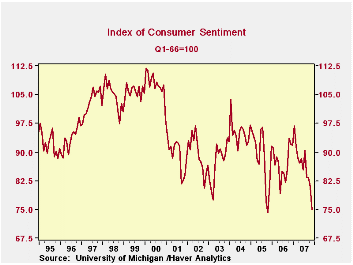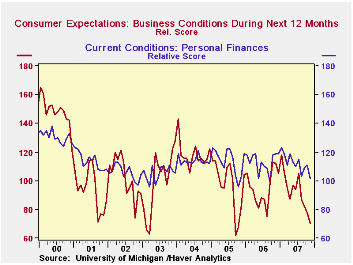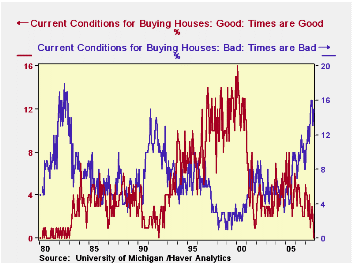 Global| Nov 09 2007
Global| Nov 09 2007Michigan Consumer Sentiment in Full Retreat
Summary
The University of Michigan's consumer sentiment index fell 5.9 points in early November to 75.0 from October's 80.9. This was a 7.3% drop, almost as large as August's 7.7%, and the fourth consecutive month without an increase. [...]

The University of Michigan's consumer sentiment index fell 5.9 points in early November to 75.0 from October's 80.9. This was a 7.3% drop, almost as large as August's 7.7%, and the fourth consecutive month without an increase. Consensus expectations in the Action Economics survey called for only a slight ease to 80.0.
Both major sub-indexes were down markedly as well. Current conditions declined from October's 97.6 to 91.0, the weakest since March 2003. Expectations fell from 70.1 to 64.7, lowest since October 2005.
All the summary line items fell by significant amounts, ranging from 5.6%, for current buying conditions, to 10.3%, for business conditions in the next 12 months. Current personal finances were down 8.1% and expected personal finances by 7.6%. Five-year business expectations fell 7.1%.
Among the survey details, those related to buying conditions for houses seem particularly relevant. The overall score for "buying conditions for houses" is 124, compared with 131 in October. This measure was 160 during the 2004 housing market peak. The overall "good time" rating eased to 61 in early November from 64 last month, while the "bad time" rating rose to 37 from 33. Readings of these respective magnitudes have prevailed for about the last 15 to 18 months, the most adverse combination since the Gulf War in late 1990/early 1991.
The survey lists reasons why this is a "good time" or a "bad time" to buy. Respondents who told the poll-takers that "times [in general] are bad" numbered 15% of the total, the highest since 1982. The number feeling that "times are good; there is prosperity" was zero. This reading has never been very high, with a peak of 16 in early 2000, just as the stock market was reaching a peak. But readings of zero have also been rare: early 1992 and the double-digit inflation/interest rate/recession period from 1980 to 1982. One favorable note came in the item home "prices are low; there are good deals"; 52% of respondents believe this is true. Perhaps there's the seed of some recovery in that.
The University of Michigan survey is not seasonally adjusted.The reading is based on telephone interviews with about 500 households at month-end; the mid-month results are based on about 300 interviews. The summary indexes are in Haver's USECON database, with details in the proprietary UMSCA database.
| University of Michigan | Nov (Prelim) | Oct | Sept | Nov y/y | 2006 | 2005 | 2004 |
|---|---|---|---|---|---|---|---|
| Consumer Sentiment | 75.0 | 80.9 | 83.4 | -18.6% | 87.3 | 88.5 | 95.2 |
| Current Conditions | 91.0 | 97.6 | 97.9 | -14.2% | 105.1 | 105.9 | 105.6 |
| Expectations | 64.7 | 70.1 | 74.1 | -22.2% | 75.9 | 77.4 | 88.5 |
Carol Stone, CBE
AuthorMore in Author Profile »Carol Stone, CBE came to Haver Analytics in 2003 following more than 35 years as a financial market economist at major Wall Street financial institutions, most especially Merrill Lynch and Nomura Securities. She had broad experience in analysis and forecasting of flow-of-funds accounts, the federal budget and Federal Reserve operations. At Nomura Securities, among other duties, she developed various indicator forecasting tools and edited a daily global publication produced in London and New York for readers in Tokyo. At Haver Analytics, Carol was a member of the Research Department, aiding database managers with research and documentation efforts, as well as posting commentary on select economic reports. In addition, she conducted Ways-of-the-World, a blog on economic issues for an Episcopal-Church-affiliated website, The Geranium Farm. During her career, Carol served as an officer of the Money Marketeers and the Downtown Economists Club. She had a PhD from NYU's Stern School of Business. She lived in Brooklyn, New York, and had a weekend home on Long Island.
More Economy in Brief
 Global| Feb 05 2026
Global| Feb 05 2026Charts of the Week: Balanced Policy, Resilient Data and AI Narratives
by:Andrew Cates





